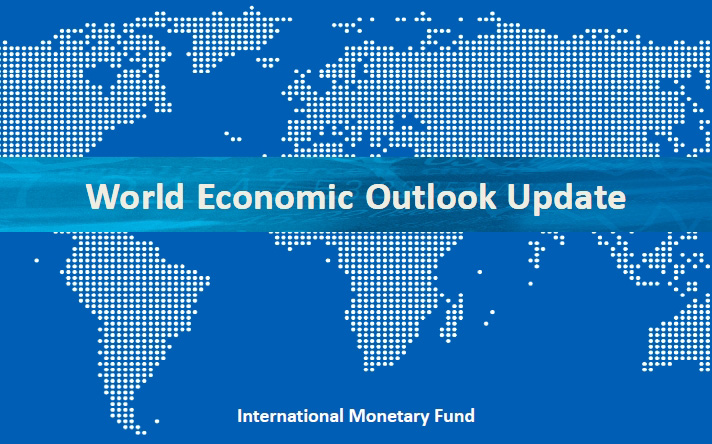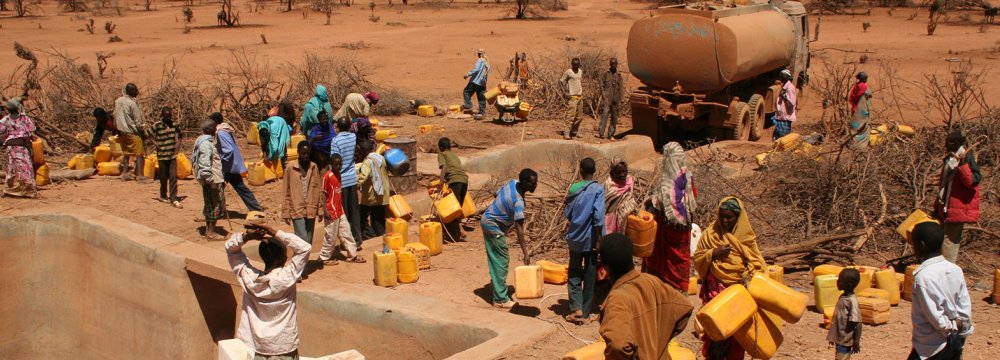
Rising Temperatures Hurting Poor Countries

The IMF’s latest World Economic Outlook, a bi-annual global economic forecast, dedicates a chapter to the potential impacts of climate change on the global economy and finds that hot, poor countries will be hit hardest, Devex.com reported.
Researchers predict that a 1 degree celsius increase in temperature in countries with an average annual temperature of 25 degrees celsius will lead to a reduction in per capita output by up to 1.5%, caused by lower agricultural output, reduced productivity of workers, negative health impacts, and a slowing down in investment.
Furthermore, these impacts will increase and “erase close to one-tenth of the per capita output of the median low-income country by the end of the 21st century,” unless drastic global efforts are made to slow climate change, the IMF report states.

“What’s most striking it how uneven the effects of climate change are going to be and that the most adverse consequences are going to be concentrated in those parts of the world—low-income countries—which have contributed least to the problem,” said Petia Topalova, deputy division chief in the IMF’s world economic studies division and a lead researcher on the report.
Furthermore, the most-affected countries are also the least capable, in terms of financial and technical resources, of adapting to the consequences of climate change, Topalova added.
In response, the report calls on developed and emerging economies to step up their financial and technical support to low-income countries to help them build resilience, while also working to mitigate and curb their own emissions.
This is critical, Topalova explained, since “advanced economies are not immune to the potential spillover effects from really vulnerable countries” for whom climate change is likely to lead to increased conflict and migration pressures.
“Climate change is a global problem and it’s very clear that no country can address it on its own,” she added.
Released on Tuesday at the start of the World Bank and IMF Annual Meetings in Washington, D.C., the WEO’s strong message about the impacts of climate change on low-income countries’ economic development prospects comes amid a generally positive economic outlook for the rest of the world.
The report predicts that global growth will increase to 3.6% in 2017 and to 3.7% in 2018 and includes “signs of improvement” in countries in sub-Saharan Africa and Latin America, which had been struggling due to price crashes in commodity markets.
How to Respond?
Developing country governments can deploy a range of policies and strategies to help limit the negative impacts of climate-related weather and temperature shocks on their country’s economic output in the short term, the report suggested.
The diagram below compares how countries with “policy buffers” in place would likely fare when compared to countries with no policies, after a 1 degree celsius temperature increase. While admitting that causal interpretation is difficult, researchers estimate that countries with lower public debt, flexible exchange rates, sound infrastructure, democratic institutions, and other policy buffers tend to experience smaller per capita decreases.
The report presents a “toolkit” of possible domestic structural resilience building policies and also a range of adaptation strategies.
Cooperation, Finance Needed
The report is clear that low-income countries will need additional support from the international community in order to insulate themselves against the negative impacts of more frequent natural disasters caused by higher temperatures.
According to Topalova, there are both equity and efficacy arguments to be made for international cooperation to help low-income countries become more resilient.
There are also two main ways through which emerging and developed countries can help. The first is by transferring finance, technology, and technical assistance to less developed countries, and the second is by taking steps to reduce their own carbon emissions.
“Climate change is a negative global externality of potentially catastrophic proportions, and only collective action and multilateral cooperation can effectively address its causes and consequences,” the report concluded.


Trump weighs using $2 billion in CHIPS Act funding for critical minerals

Codelco cuts 2025 copper forecast after El Teniente mine collapse

Electra converts debt, launches $30M raise to jumpstart stalled cobalt refinery

Barrick’s Reko Diq in line for $410M ADB backing

Abcourt readies Sleeping Giant mill to pour first gold since 2014

Nevada army depot to serve as base for first US strategic minerals stockpile

SQM boosts lithium supply plans as prices flick higher

Viridis unveils 200Mt initial reserve for Brazil rare earth project

Tailings could meet much of US critical mineral demand – study

Kyrgyzstan kicks off underground gold mining at Kumtor

Kyrgyzstan kicks off underground gold mining at Kumtor

KoBold Metals granted lithium exploration rights in Congo

Freeport Indonesia to wrap up Gresik plant repairs by early September

Energy Fuels soars on Vulcan Elements partnership

Northern Dynasty sticks to proposal in battle to lift Pebble mine veto

Giustra-backed mining firm teams up with informal miners in Colombia

Critical Metals signs agreement to supply rare earth to US government-funded facility

China extends rare earth controls to imported material

Galan Lithium proceeds with $13M financing for Argentina project

Kyrgyzstan kicks off underground gold mining at Kumtor

Freeport Indonesia to wrap up Gresik plant repairs by early September

Energy Fuels soars on Vulcan Elements partnership

Northern Dynasty sticks to proposal in battle to lift Pebble mine veto

Giustra-backed mining firm teams up with informal miners in Colombia

Critical Metals signs agreement to supply rare earth to US government-funded facility

China extends rare earth controls to imported material

Galan Lithium proceeds with $13M financing for Argentina project

Silver price touches $39 as market weighs rate cut outlook

















